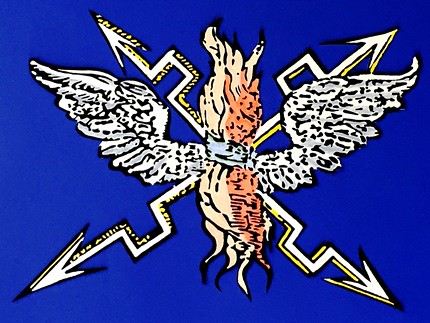Those in need of visible proof
of the power in the sky need only
view the effect of the burning bolt
flung earthward from on high
by an agent of fear and terror and despair
and painful agonies and chilling frights
whose rage and fury stoke the dread
that turns lost souls into religious ones.
Of the two kinds of fear one ought to have towards God, the first is reverential fear, which is what the angels, the beatified, and the just [have towards Him]. The second is servile fear, which is a posture often assumed towards what is perfect, as we see in the conversion of the Apostle Paul and other saints. The sight of lightning and sound of thunder give pause even to those who have not heard the true word of God, who intuit that there is a first cause that moves and governs the machinery of our world; and with that they are brought to reverence it, and to fear it however they may. To signify this, I have put a lightning bolt of the kind that painters commonly give to Jupiter, with the heading:
THE FIRST TO BRING GODS INTO THE WORLD WAS FEAR
It is taken from [the speech of Capaneus from the Thebaid of] Statius, the poet of ancient Naples. The word deos means "fear" [in Greek]; written with theta instead of delta—i.e., theos—the word means "god."
The kingly prophet David speaks of lightning as God's missiles in Psalm 144:6: "Send out Your arrows and throw the people into turmoil," and in Psalm 77:17–18: "Your arrows flew all over; the voice of Your thunder was in the whirlwind." And at Job 40:9: "Is your arm like God's arm? And is the sound of your voice like His?"
From the Emblemas morales (1610) of Sebastián de Covarrubias y Orozco (Emblem 101).








